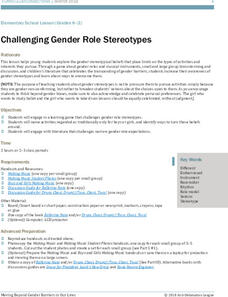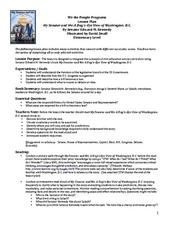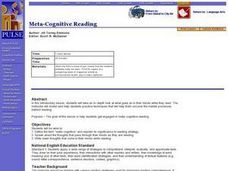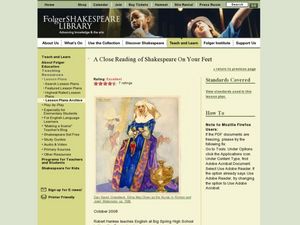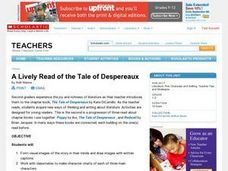Anti-Defamation League
"What is it Like to be an Outsider?”: Building Empathy for the Experiences of Immigrants
This instructional activity highlights the struggles of immigrants and the importance of showing empathy. Beginning with a read-aloud of a book in another language and a poem, scholars take part in a thoughtful discussion. Then, the...
Anti-Defamation League
Challenging Gender Role Stereotypes
Through thoughtful discussion and a read-aloud, scholars challenge gender role stereotypes. Pupils examine pictures and collaborate with their small groups to debunk stereotypes. They explain what gender role stereotypes they know of and...
Curated OER
Getting to Know You
After going over the five steps of the writing process, pupils fill out "Getting to Know You" worksheets. They trade papers with each other, and have the task of writing a descriptive paragraph about the person whose worksheet they...
Utah Education Network (UEN)
Add a Quack, Quack Here
The teacher will read-aloud the book Quack and Count and call upon studens to demonstrate various sums of seven. They brainstorm a list of ideas of things that can be combined or added together. They are given unifix cubes to demonstrate...
Curated OER
Pendemonium: The Great African Surfari
Young scholars discover the importance of matching verbs to their subjects through a discussion of a whimsical video on verb agreement and a read aloud of the book, "To Root, To Toot To Parachute". They practice verb agreement in...
Curated OER
Insect or Arachnid?
Students compare and contrast the characteristics of insects and arachnids through research, observation, and discussion. They write accurate statements describing insect and arachnid life cycles and anatomies. Afterward, they listen as...
Curated OER
Which Story Matches the Given Theme?
Model for young learners how to determine the theme of a story. Read aloud Aesop’s The Fox and the Stork. Chart the plot and the main idea of the fable, showing class members how these elements support the theme. Fable titles for guided...
Curated OER
Deciding Theme
Read aloud to your class the fable "The Lion and the Mouse" as you explore characters' choices and the effects they have on a story. Apply what is discussed to finding a theme of the chapter "Not Giving Up" from The Wizard of Oz.
Curated OER
Mouse Mess
Scholars practice rhyming and phonemic awareness using trade books and poetry. They will listen to the book Mouse Mess several times throughout the week, identifying rhyming words, and matching words that begin with the same sound. Then...
National Endowment for the Humanities
Arabic Poetry: Guzzle a Ghazal!
Learners research the evolution and cultural significance of the Arabic ghazal form of poetry. They, in groups, compose an original ghazal poem and read it aloud to the class.
Curated OER
Cause and Effect
Third graders listen to a story read aloud in order to discover the concept of cause and effect. With a partner, they make a cause/effect puzzle from a sentence strip. They then choose and read a story on the internet and make a...
Curated OER
My Senator and Me: A Dog's-Eye View of Washington, D.C.
Although this legislative process lesson is designed to accompany a specific text, it is valuable independently. Young learners participate in a picture walk (worksheet included) through My Senator and Me: A Dog's-Eye View of Washington,...
Curated OER
Jubal's Wish
Students discuss the story "Jubal's Wish." In this literature lesson, students take turns making predictions about what will happen next in the story and state their own wish by taking turns as well.
Curated OER
Read It, Picture It! Reading to Learn
Students examine the reading comprehension strategy of visualization. They practice visualization by making pictures in their mind. They draw the pictures from their visualizations with explanations.
Curated OER
Meta-Cognitive Reading
Students define the term "meta-cognitive" and explain its significance to reading strategy. They speak aloud the thoughts that pass through their minds as they are reading and write down thoughts that come to their minds while reading.
Curated OER
Using Technology For Vocabulary Development, reading Comprehension, and Word Identification
Fourth graders define unknown vocabulary words and decode unknown words in their reading using a Quicktionary Reading Pen and Franklin Spell Checker. They create reading comprehension questions that are incorporated into a classroom Web...
Curated OER
Guided Reading with Confetti Eggs
First graders read the book, Confetti Eggs. Working in guided reading groups, they discuss making crafts with eggs and preview the book by looking at the pictures and making predictions. After reading the book aloud, they discuss how to...
Curated OER
Guided Reading with Where Is My Puppy?
First graders read the book, Where Is My Puppy? Working in guided reading groups, they discuss having a puppy and predict what might occur in the story. After reading the book aloud, they retell the story and locate the puppy on each page.
Curated OER
A Cloe Reading of Shakespeare On Your Feet
Students act outeach word in a Shakespearean speech. In this reading technique lesson, students learn passages from Romeo and Juliet and The Taming of the Shrew reading using their bodies to act out each word. Students watch an...
Curated OER
Apply Post-Reading Skills and Discuss Persuasive Text
Students put their reading comprehension skills to practice. In this interpreting text instructional activity, students read "Chief Red Jacket's Reply," and then respond to questions that require them to reason, infer, and analyze the...
Curated OER
Lively Read of the Tale of Despereaux
Students create a character map of the main characters in The Tale of Despereaux. After reading the text, students create a character chart based on information they gleaned from the story. They use this information to write a letter...
Curated OER
Read It, Don't Eat It!
Students complete activities based on the book Read It, Don't Eat It! In this library rules lesson, students are read a story that illustrates library rules, then match the rules with pictures and complete a maze.
Curated OER
Readings in Hudson River Natural History: Understanding Informational Text
After reading a series of informational articles regarding the Hudson River Estuary, the class will answer a series of comprehension questions. An answer key is provided but the articles and worksheets are not.
Curated OER
Reading About Children in Other Communities
Students read about children from other communities. They describe ways in which members of other communities meet one another's needs and design a Venn diagram that compares and contrasts their own way of living to another culture.
Other popular searches
- Book Read Alouds
- Interactive Read Alouds
- Picture Book Read Alouds
- Big Book Read Alouds
- Read Alouds Lesson Plan
- Memoir Read Alouds
- Read Alouds Comprehension
- Great Read Alouds
- Read Alouds Grade 6
- Scary Stories Read Alouds
- Teacher Read Alouds
- Read Alouds and Lessons



